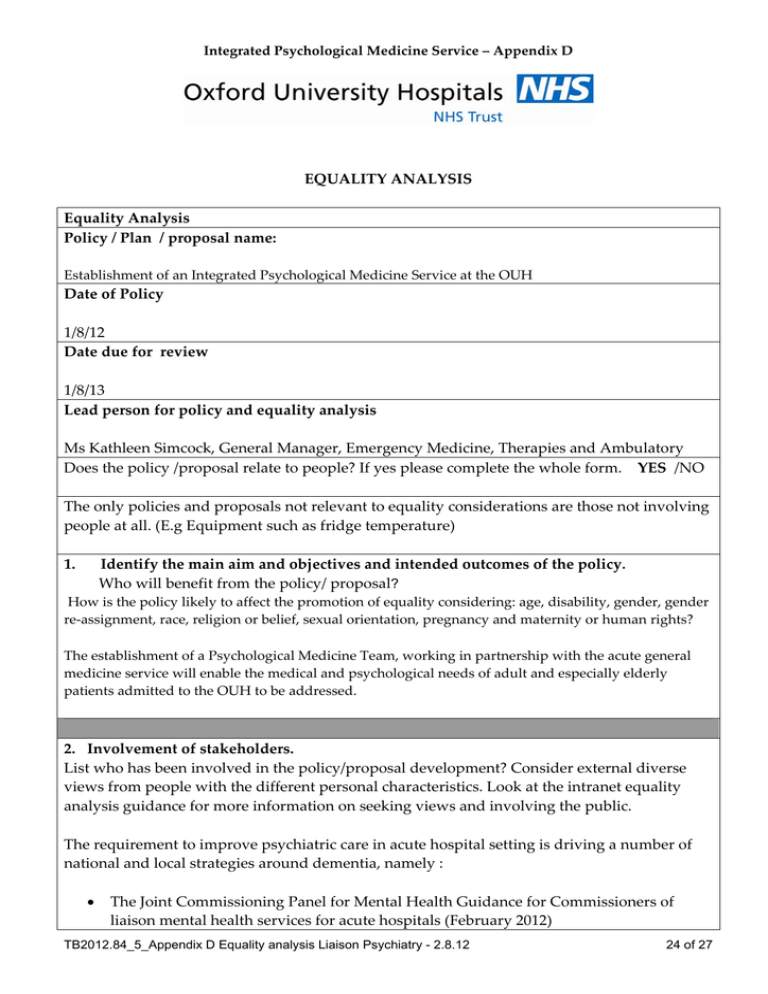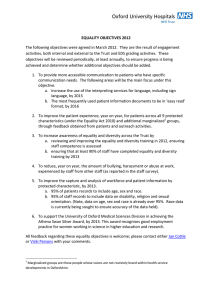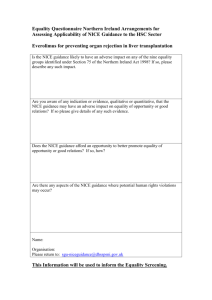
Integrated Psychological Medicine Service – Appendix D EQUALITY ANALYSIS Equality Analysis Policy / Plan / proposal name: Establishment of an Integrated Psychological Medicine Service at the OUH Date of Policy 1/8/12 Date due for review 1/8/13 Lead person for policy and equality analysis Ms Kathleen Simcock, General Manager, Emergency Medicine, Therapies and Ambulatory Does the policy /proposal relate to people? If yes please complete the whole form. YES /NO The only policies and proposals not relevant to equality considerations are those not involving people at all. (E.g Equipment such as fridge temperature) 1.
Identify the main aim and objectives and intended outcomes of the policy.
Who will benefit from the policy/ proposal?
How is the policy likely to affect the promotion of equality considering: age, disability, gender, gender re‐assignment, race, religion or belief, sexual orientation, pregnancy and maternity or human rights? The establishment of a Psychological Medicine Team, working in partnership with the acute general medicine service will enable the medical and psychological needs of adult and especially elderly patients admitted to the OUH to be addressed. 2. Involvement of stakeholders. List who has been involved in the policy/proposal development? Consider external diverse views from people with the different personal characteristics. Look at the intranet equality analysis guidance for more information on seeking views and involving the public. The requirement to improve psychiatric care in acute hospital setting is driving a number of national and local strategies around dementia, namely : The Joint Commissioning Panel for Mental Health Guidance for Commissioners of liaison mental health services for acute hospitals (February 2012) TB2012.84_5_Appendix D Equality analysis Liaison Psychiatry - 2.8.12
24 of 27
Living Well with Dementia – A National Dementia Strategy (February 2009) Oxfordshire Dementia Plan (March 2011) Oxfordshire’s Joint Health and Well–Being Strategy 2012‐2016 This proposal is entirely consistent with delivering the improvements in care that are required. 3. Evidence. Look at all the evidence of the different ways the policy/ proposal may affect different groups. List the sources of data you have reviewed to decide on the impact on each of the equality groups. ( E.g. national research, local population information, information on the equality intranet, PALs, complaints and patient feedback). Population information on www.healthprofiles.info search for Oxfordshire. Disability Have you consulted with someone who has a disability? Attitudinal, physical and social barriers E.g People who are deaf need to have access to British Sign Language; people with a learning disability needs access to additional support and easy read information; people who have a physical disability must not be disadvantaged in accessing facilities such as for toilet/bathing. No adverse impact Sex Consider the potential impact on men and women E.g same sex accommodation and personal care. No adverse impact Age Will different age groups be affected differently? Is any age group at a disadvantage? This proposal will enable improved care to be given to an increasingly elderly population where current provision is not adequate. Race Consider the impact of this policy/proposal on different ethnic groups such as gypsies and travellers or people who do not speak English. Consider cultural implications of what is proposed in the policy. No adverse impact Sexual orientation Consider the effect on heterosexual, gay, lesbian and bi‐sexual people. Document any considerations. Consider staff attitude and involvement of same sex partners. No adverse impact Pregnancy and maternity Will the policy affect people who are pregnant or who have children less than one year differently? Consider TB2012.84_5_Appendix D Equality analysis Liaison Psychiatry ‐ 2.8.12 25 of 27 working arrangements, part time working, caring responsibilities and breast‐ feeding facilities. No adverse impact Religion or belief. Will the proposal affect people of different religions or belief differently? E.g Consider implications for practicing their religion, dietary, fasting and festivals. Consult with ORH Chaplaincy Team for advice and guidance about how the policy may affect different groups, positively or negatively. No adverse impact Gender re‐assignment. Will the policy or proposal affect transgender or transsexual people differently? Consider privacy issues and potential for harassment. No adverse impact Marriage or civil partnerships: No adverse impact Carers Remember to ensure carers are fully involved, informed, supported and they can express their concerns. Consider the need for flexible working. The provision of specialist expertise will enable carers to be more directly involved in the care of the patients which will improve both theirs and the patient’s experience. Other potential impacts e.g. culture, human rights, socio economic e.g. homeless people Section 4 Summary of Analysis Does the evidence show any potential to discriminate? Please state how the policy or proposals impact on elimination of discrimination, harassment and victimisation. ( age, disability, sex, gender re‐assignment, pregnancy and maternity, race, religion or belief, sexual orientation, marriage and civil partnerships and human rights). Are there any barriers to access or engagement? No How will you reduce any negative impacts? Appointment to the posts included in the case will be in line with Trust HR policies. Staff TB2012.84_5_Appendix D Equality analysis Liaison Psychiatry ‐ 2.8.12 26 of 27 will be eligible to be appointed on a full or part time basis in line with Trust HR policies. If your assessment shows the policy or proposal is likely to have an adverse impact on a particular group and a potential to discriminate, please decide whether to: Make changes that will reduce concerns. Consider different ways of putting the proposed policy into practice, to reduce its potential to affect some groups adversely. Find alternative means of achieving the policy. Justify the policy, even though it could affect some groups adversely.
Are you sure you can legally justify the action? If there is no alternative action to avoid discrimination please explain why. 4.1 Are there aspects that could be changed? Could additional measures be taken to reduce or remove adverse impact without affecting the policy’s overall aims? 4.2 If you decide the policy needs to go through without alteration, despite adverse impact, are you sure you can legally justify this action? 4.3 How does the policy promote equality of opportunity? How does the policy advance equality of opportunity? (Age, disability, sex, gender re‐
assignment, pregnancy and maternity, race, religion or belief, sexual orientation and human rights). This means minimizing disadvantage and meeting the needs of people, with protected characteristics and promoting their participation. This service development will provide improved access to adult s and elderly patients in particular to improved psychological and psychiatric care. How does the policy promote good relations between groups? (Promoting understanding) The establishment of an Integrated Psychological Medicine Service at the OUH will improve collaborative working with acute and general medicine, geratology, stroke services and trauma in particular. It also presents an opportunity for collaborative working with Mental Health Services and GPs. TB2012.84_5_Appendix D Equality analysis Liaison Psychiatry ‐ 2.8.12 27 of 27






